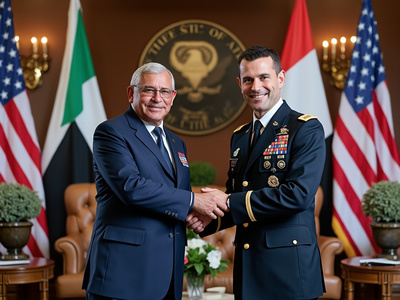U.S. Initiates Military Strikes Against Yemen's Houthis Amid Tensions with Iran
Washington conducts air strikes while reinforcing its stance against Iranian influence in the region.
The United States has commenced military strikes against the Iran-aligned Houthi movement in Yemen, a significant escalation in its ongoing campaign to counter Iranian influence in the Middle East.
This military action was announced by U.S. officials, marking an assertive shift in America's military posture towards the Houthis, who have been involved in the Yemen conflict since 2014.
President Donald Trump stated that the Houthis 'will never sink our ships again,' alluding to recent threats and acts of aggression by Houthi forces against commercial vessels in the strategically vital Red Sea.
The U.S. has accused the Houthis of targeting international shipping lanes, which prompted a swift military response.
The strikes come in the wake of increasing tensions in the region.
The Houthis, with backing from Iran, have launched missiles and drone attacks that have raised alarms among regional and international stakeholders.
U.S. military operations in the area aim to deter further Houthi aggression and to reassure allies of America's commitment to maritime security.
This military initiative is part of a broader pressure campaign against Iran, which includes sanctions and diplomatic measures designed to limit Iran's influence and its proxies across the region.
U.S. officials signal that the strikes demonstrate America's resolve in upholding freedom of navigation and countering destabilizing activities from state and non-state actors alike.
The Yemen conflict has resulted in a severe humanitarian crisis, with millions of civilians affected by violence and famine.
The Houthi movement has been fighting against a Saudi-led coalition backing the internationally recognized government of Yemen, and the ongoing conflict has drawn in multiple regional and international powers, further complicating peace efforts.
The developments in Yemen are being closely monitored by the international community, which has called for de-escalation and a renewed push towards diplomatic negotiations to end the protracted conflict.
As the situation evolves, the potential for increased military engagement remains a topic of concern for analysts and observers in the region and around the world.
This military action was announced by U.S. officials, marking an assertive shift in America's military posture towards the Houthis, who have been involved in the Yemen conflict since 2014.
President Donald Trump stated that the Houthis 'will never sink our ships again,' alluding to recent threats and acts of aggression by Houthi forces against commercial vessels in the strategically vital Red Sea.
The U.S. has accused the Houthis of targeting international shipping lanes, which prompted a swift military response.
The strikes come in the wake of increasing tensions in the region.
The Houthis, with backing from Iran, have launched missiles and drone attacks that have raised alarms among regional and international stakeholders.
U.S. military operations in the area aim to deter further Houthi aggression and to reassure allies of America's commitment to maritime security.
This military initiative is part of a broader pressure campaign against Iran, which includes sanctions and diplomatic measures designed to limit Iran's influence and its proxies across the region.
U.S. officials signal that the strikes demonstrate America's resolve in upholding freedom of navigation and countering destabilizing activities from state and non-state actors alike.
The Yemen conflict has resulted in a severe humanitarian crisis, with millions of civilians affected by violence and famine.
The Houthi movement has been fighting against a Saudi-led coalition backing the internationally recognized government of Yemen, and the ongoing conflict has drawn in multiple regional and international powers, further complicating peace efforts.
The developments in Yemen are being closely monitored by the international community, which has called for de-escalation and a renewed push towards diplomatic negotiations to end the protracted conflict.
As the situation evolves, the potential for increased military engagement remains a topic of concern for analysts and observers in the region and around the world.
Translation:
Translated by AI











